Related Research Articles
Ann Fagan Ginger is an American lawyer, teacher, writer, and political activist. She is the founder and Executive Director Emerita of the Meiklejohn Civil Liberties Institute in Berkeley, California.
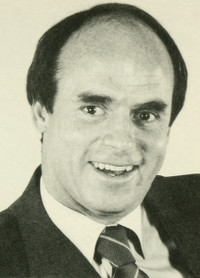
Thomas Michael "Tom" Finneran, is a radio talk host and former Massachusetts Democratic politician who served as Speaker of the Massachusetts House of Representatives from April 1996 to September 2004. He represented the district that included parts of the Boston neighborhoods of Dorchester, Mattapan and Hyde Park as well as parts of the town of Milton for 26 years.

Bruce Robert Jacob is a former Assistant Attorney General for the State of Florida during the early 1960s. He represented Louie L. Wainwright, the Director of the Florida Division of Corrections, in the Supreme Court case of Gideon v. Wainwright, decided in March 1963, regarding the right to counsel of indigent defendants in non-capital felony cases in state courts. The attorney representing the Petitioner, Clarence Gideon, was Abe Fortas, a Washington, D.C. lawyer who later became a Justice of the Supreme Court. The previous 1942 Supreme Court case of Betts v. Brady required the appointment of counsel for an indigent defendant at state expense if there was a “special circumstance” present in the case which made it necessary for counsel to be provided for the defendant to receive a fair trial. For example, if the defendant was indigent and was extremely young, or lacked education or experience, was unfamiliar with court procedures, or if the charges against him were complex, the trial court was required under the Due Process Clause of the Fourteenth Amendment to appoint counsel. Jacob argued against any extension of the defendant's right to counsel. The Court in Gideon overruled Betts and required state courts to appoint attorneys for defendants in all felony prosecutions.
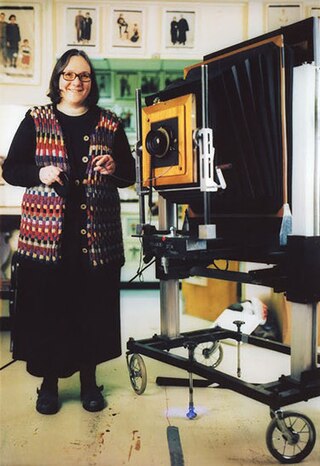
Elsa B. Dorfman was an American portrait photographer. She worked in Cambridge, Massachusetts, and was known for her use of a large-format instant Polaroid camera.
Susan Estrich is an American lawyer, professor, author, political operative, and political commentator. She is known for serving as the campaign manager for Michael Dukakis in 1988 and for serving in 2016 as legal counsel to the former Fox News chairman Roger Ailes.
Wendy Kaminer is an American lawyer and writer. She has written several books on contemporary social issues, including A Fearful Freedom: Women's Flight From Equality, about the conflict between egalitarian and protectionist feminism; I'm Dysfunctional, You're Dysfunctional: The Recovery Movement and Other Self-Help Fashions, about the self-help movement; and Sleeping with Extra-Terrestrials: The Rise of Irrationalism and Perils of Piety.
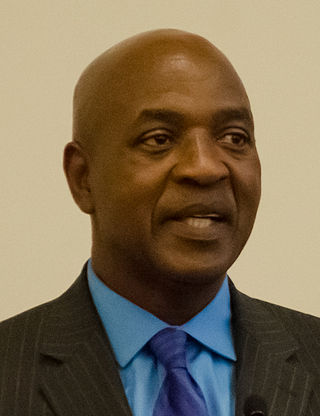
Charles James Ogletree Jr. was an American legal scholar who served as the Jesse Climenko Professor at Harvard Law School, where he was the founder of the school's Charles Hamilton Houston Institute for Race and Justice. He was also the author of books on legal topics.

Zechariah Chafee Jr. was an American judicial philosopher and civil rights advocate, described as "possibly the most important First Amendment scholar of the first half of the twentieth century" by Richard Primus. Chafee's avid defense of freedom of speech led to Senator Joseph McCarthy calling him "dangerous" to America.
Paul Julian Liacos was the chief justice of the Massachusetts Supreme Judicial Court from 1989 to 1996.
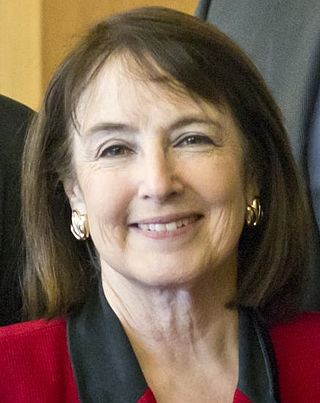
Nancy Gertner is a former United States district judge of the United States District Court for the District of Massachusetts. She assumed senior status on May 22, 2011, and retired outright from the federal bench on September 1, 2011. She is now a professor of practice at Harvard Law School.
William F. Lee is an American intellectual property and commercial litigation trial attorney. As co-managing partner of WilmerHale, Lee was the first Asian-American to lead a major American law firm. He is also a Senior Fellow of the Harvard Corporation, the governing board of Harvard University.

Henry Gordon Wells was a lawyer and a Republican politician in Massachusetts and New Hampshire.

On July 16, 2009, Harvard University professor Henry Louis Gates Jr. was arrested at his Cambridge, Massachusetts, home by local police officer Sgt. James Crowley, who was responding to a 911 caller's report of men breaking and entering the residence. The arrest initiated a series of events that unfolded under the spotlight of the international news media.
Monroe Henry Freedman was a professor of law and the former dean at Hofstra Law School. He lectured at Harvard Law School annually for 30 years, and was a visiting professor at Georgetown Law School from 2007 to 2012. He has been described as "a pioneer in the field of legal ethics" and "one of the nation's leading experts on legal ethics."
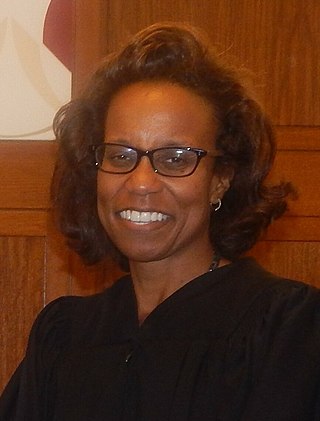
Denise Jefferson Casper is an American attorney serving as a United States district judge of the United States District Court for the District of Massachusetts. She used to be the Deputy District Attorney for the Middlesex District Attorney's Office in Cambridge, Massachusetts. Casper is the first black female judge to serve on the federal bench in Massachusetts. Casper is also notable for presiding over the criminal trial of Whitey Bulger.
Dermot James Meagher was an American lawyer and former judge of the Boston Municipal Court. Meagher was the first openly gay judge appointed in Massachusetts.
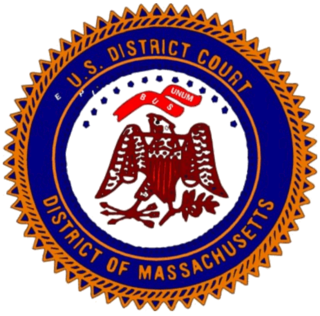
In United States of America v. Aaron Swartz, Aaron Swartz, an American computer programmer, writer, political organizer and Internet activist, was prosecuted for multiple violations of the Computer Fraud and Abuse Act of 1986 (CFAA), after downloading academic journal articles through the MIT computer network from a source (JSTOR) for which he had an account as a Harvard research fellow. Federal prosecutors eventually charged him with two counts of wire fraud and eleven violations of the Computer Fraud and Abuse Act, charges carrying a cumulative maximum penalty of $1 million in fines plus 35 years in prison, asset forfeiture, restitution and supervised release. Facing trial and the possibility of imprisonment, Swartz committed suicide, and the case was consequently dismissed.

Carmen Milagros Ortiz is an attorney, college instructor, and former United States Attorney for the District of Massachusetts.
Stephen P. Heymann is an attorney who formerly served as an Assistant U.S. Attorney for the District of Massachusetts. He is no longer with the U.S. Attorney's office. He headed U.S. Attorney Carmen Ortiz's Internet and Computer Crimes Unit.
Donald Cotesworth Gellers, also known by his Jewish name Tuvia Ben-Shmuel Yosef, was an American lawyer. In the 1960s he lived in Eastport, Maine, where he represented members of the Passamaquoddy tribe in court and advocated for their civil rights. In 1968 he filed a land claim suit on the tribe's behalf. Immediately after filing the suit he was charged with constructive possession of six marijuana cigarettes. He was convicted on a felony charge and sentenced to prison. After an unsuccessful appeal process, he moved to Israel without serving his sentence. He returned to the United States in 1980 and practiced as a rabbi until his death. In 2020 he was granted a posthumous pardon by the state of Maine.
References
- 1 2 3 "Archive". Harvey A. Silverglate. Archived from the original on 15 October 2023. Retrieved 2023-12-05.
- ↑ Harvey Silverglate profile Archived 2008-03-30 at the Wayback Machine , Foundation for Individual Rights in Education website]; accessed March 20, 2008.
- ↑ Harvey Silverglate, Foundation for Individual Rights in Education. Accessed July 3, 2023. "Harvey Silverglate was born in New York (1942) and was educated at Bogota (N.J.) High School (1960), Princeton University (1964), and Harvard Law School (1967)."
- ↑ Fausset, Richard; Hakim, Danny (31 August 2022). "Conservative Lawyer a Likely Target in Atlanta Trump Investigation, His Lawyer Says". New York Times.
- ↑ Suter, Tara (2 August 2023). "Eastman lawyer says plea deal would be rejected if offered in Jan. 6 case". The Hill.
- ↑ "Harvey Silverglate profile". thephoenix.com . Archived from the original on 19 October 2023. Retrieved 20 March 2008.
- ↑ Sacchetti, Maria (April 13, 2013). "Ralliers at Dewey Square remember Internet activist Aaron Swartz". Boston Globe. Retrieved May 1, 2015.
- 1 2 McCullagh, Declan (2013-01-25). "Swartz didn't face prison until feds took over case, report says". CNET . Archived from the original on 2023-03-09. Retrieved 2015-05-01.
- 1 2 Silverglate, Harvey (January 23, 2013). "The Swartz suicide and the sick culture of the DOJ". Massachusetts Lawyers Weekly. Archived from the original on 2013-01-29.
- ↑ "Savannah Morning News". savannahnow.com. Retrieved 2023-08-14.
- ↑ "Harvey's Board of Overseers platform". Archived from the original on 2009-02-24. Retrieved 2009-03-13.
- ↑ Lehigh, Scot (25 February 2009). "Free Speech at Harvard". boston.com . Archived from the original on 2 March 2009. Retrieved 1 May 2015.
- ↑ Andrew Kalloch, "Silverglate seeks spot as university overseer" Archived 2010-03-02 at the Wayback Machine , hlrecord.org; accessed May 1, 2015.
- ↑ "Freedman on Greater Boston" (with Emily Rooney), streams.wgbh.org; accessed May 1, 2015.
- ↑ Robert J. Ambrogi, Lawyers Fail in Campaigns for Harvard Overseers, legalblogwatch.typepad.com; accessed May 1, 2015.
- ↑ Feeney, Mark (May 30, 2020). "Elsa Dorfman, photographer whose distinctive portraits illuminated her subjects and herself, dies at 83". The Boston Globe. Archived from the original on May 31, 2020. Retrieved May 30, 2020.
- ↑ Becker, Deborah (May 30, 2020). "Cambridge Photographer Elsa Dorfman, Famous For Her Giant Polaroids, Dies At 83". WBUR-FM. Retrieved May 30, 2020.